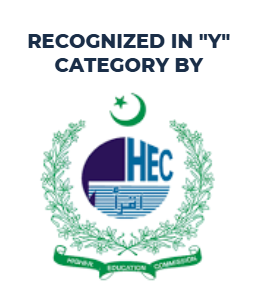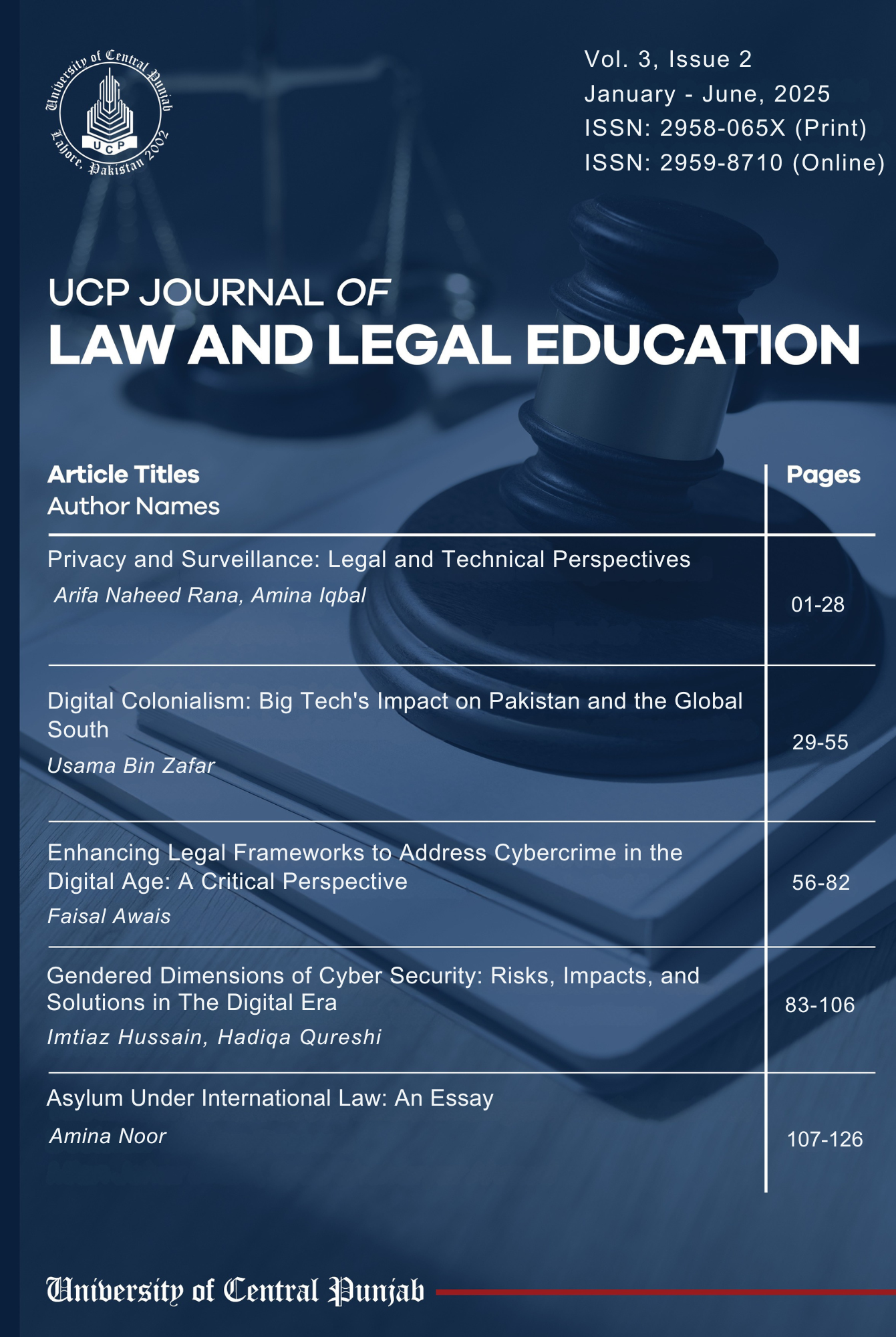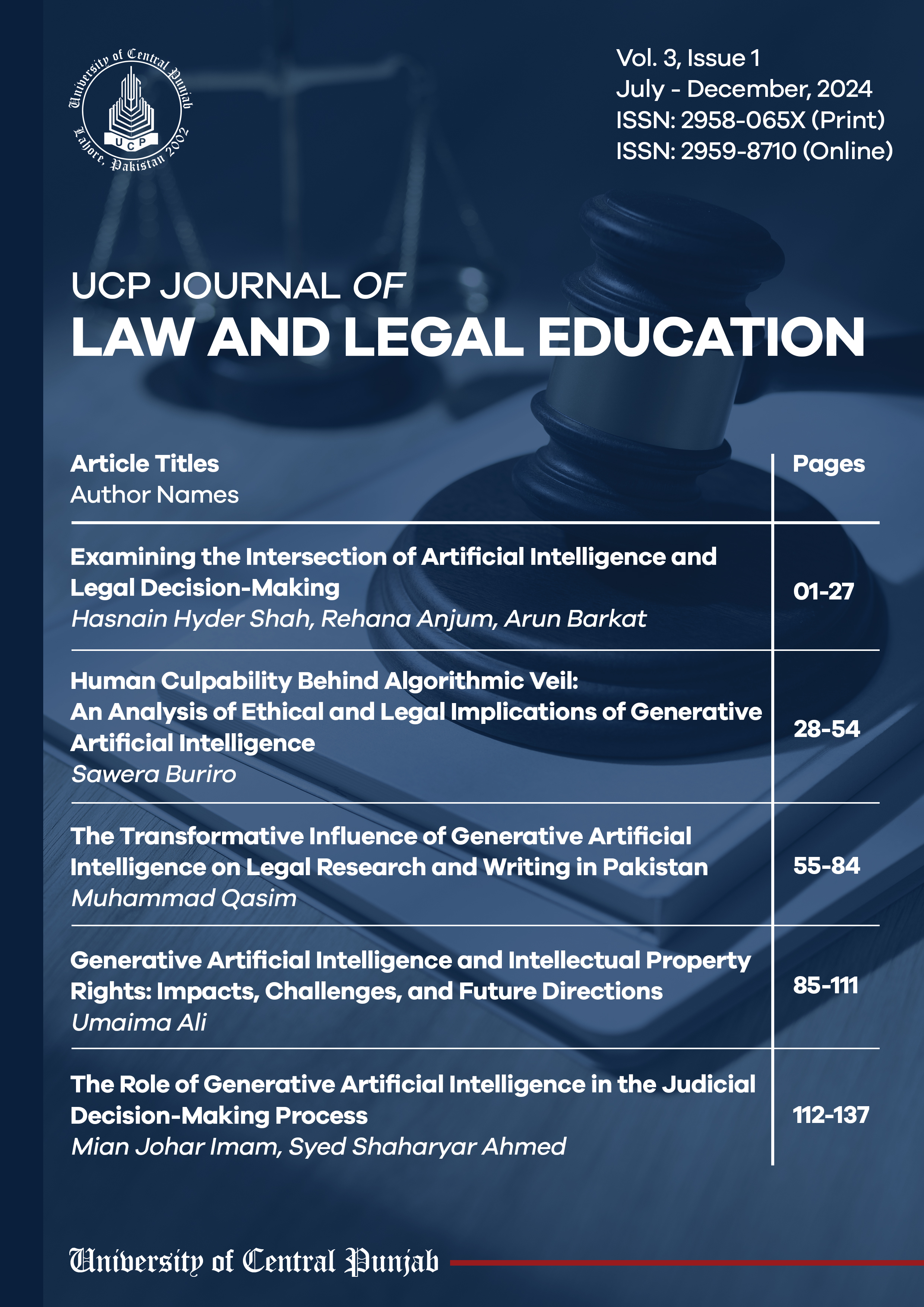
Archives
-

UCP Journal of Law and Legal Education
Vol. 2 No. 2 (2024)Volume 2, Issue 2, UCP-JLLE contains five articles. The first four articles explore concerns within the areas of Technology and Artificial Intelligence, whereas the discussion in the last falls within the domain of international law. In the first paper, Aly Hassam Ul Haq discusses the right to privacy and personal data protection in the context of emerging threats due to the increasing digital data collection. The author analyses Pakistan’s Proposed Personal Data Protection Bill of 2021 in the light of fundamental principles relating to protecting privacy and personal data derived from international best practices. While holding that the proposed bill does not meet international standards, the author suggests amendments to the same in the interest of the Right to privacy and personal data protection of all data subjects. M.P. Ramaswamy authors the second article. While arguing that the normative prescriptions for the use of AI in legal practice are crucial, the author studies the use of Generative AI in legal practice specifically in the United States of America. The author assesses professional and judicial standards governing the use of GAI in the US and studies their relevance in other jurisdictions. The author then highlights the limits of continuing legal education to produce AI-powered Lawyers and proposes the revamping of the law school curriculum to align with emerging AI applications and regulatory standards. The paper written by Bakhtawar Ashraf discusses the effects of AI on human rights. The author argues that AI has more negative than positive impacts on various rights including equality, freedom of speech, freedom of employment etc. The author furthers her discussion by highlighting the infringements by AI of the rights to education, entertainment and other socio-political rights. The author while exploring the possibility of assigning legal personality to Artificial Intelligence tools, accentuates the need for developing regulatory frameworks and collaborations between states, AI system users and developers to control the adverse effects of AI on human rights. In the fourth paper, Syed Shaharyar Ahmed’s research addresses AI and digital human rights, using ChatGPT as a case example. The paper evaluates digital rights through the prism of human rights and underscores the need for a human-centred approach to AI. The paper studies various approaches to remedy the breaches of digital human rights and recommends ways to mitigate the fallout of AI’s use within the Human rights domain. In the last article, Abdullah Mohsin, Alexandros Anthis and Sabrina Camille review the Indus Water treaty in the context of India’s demands for renegotiations. The paper studies the historical background of the Indus Water Treaty and reviews the key treaty provisions. It elaborates upon the need for renegotiation of the treaty and proposes amendments keeping in view that the Indus Basin is situated in the area worst affected by climate change. The proposed amendments include the utilisation of the river water, global climate change, utilisation of groundwater, joint basin development and enhancing the role of the Permanent Indus Commission.
We are thankful to the authors for their contributions to the Second volume, Issue 2 of UCP-JLLE and appreciate their patience through the strenuous review process. We extend our heartfelt gratitude to all members of the Advisory Board for their guidance.
-

UCP Journal of Law and Legal Education
Vol. 1 No. 1 (2022)University of Central Punjab Journal of Law and Legal Education (UCP-JLLE) fundamentally focuses on the promotion of constant dialogue and academic research. It is devoted to soliciting and publishing the views of legal academics and professionals on contemporary legal matters. The intent is to provide a platform for a paramount forum for contemplative and scholastic engagement in the wide range of issues of law and legal education. We are delighted to present the first issue of Volume one of UCP-JLLE.
The current issue contains five articles addressing questions from the areas of law and legal education. Ms. Khadija Amer critically analyzes the Frederick Schauer's Attempt to revive John Austin's theory of law against the criticisms of HLA Hart. She examins Schaur's misconceptions expressed in 'Was Austin right afterall?' in criticising HLA Hart. Syed Muhammad Aala Imran Sherazi secrutinizes the Pakistan's cyber laws in the context of cyber warfare and cyberdefence while advocating the need for developed and transnational cyberlaws for Pakistan. The third Article by Mr. Ishtiaq Ch. discusses the chowkidara system as a missing institute and highlights how the revival of this institute can bring solace to the law and order challenges of the society. Ms. Neelam Jaffari studies the Transgender Persons (Protection of Rights) Act, 2018 while foregrounding the personal, social and legal issues faced by transgenders. Her study also takes into account the legal and judicial development on the rights of transgenders in other jurisdictions.
We are thankful to the authors for their contributions to the first issue of UCP-JLLE and appreciate their patience through review process. We extend our heartfelt gratitude to all members of Advisory Board whose guidance and advice made this publication possible.
-

UCP Journal of Law and Legal Education
Vol. 1 No. 2 (2023)University of Central Punjab Journal of Law and Legal Education (UCP-JLLE) fundamentally focuses on the promotion of constant dialogue and academic research. It is devoted to solicit and publish the views of legal academics and professionals on contemporary issues regarding law and legal education. We are delighted to present the second issue of Volume One of UCP-JLLE.
The current issue includes five articles addressing questions from the areas of law and legal education. The first article is authored by Rana Rizwan Hussain. Hussain explores case laws from Pakistan to determine the features and sources of public policy and the principles developed thereupon. The author deduces that a foreign award questioning a principle of public policy may face trouble in seeking enforcement in Pakistan. In the second article, Mehboob Usman and others present an elaborate review of the recommendations of the Council of Islamic Ideology on family laws. The authors highlight the need to follow the Council’s recommendations in letter and spirit to bring family laws in consonance with the injunctions of Islam. The last three articles address exigent issues in the field of legal education. Ainul Jaria BT. Maidin accentuates the significance of clinical legal education for the practical training of law students in the background of the challenges and prospects of introducing clinical legal education programmes. The author views the paradigm shift from the traditional pedagogy as imperative and concludes that teaching, learning and research in legal education can only develop through clinical programmes. In the next article, Sardar Shah and others survey law students’ perceptions of legal education in Pakistan to spotlight the strengths and weaknesses of the current education system and forward recommendations. The last article by Stephen Rosenbaum discusses the role of law students in filling the gap in access to justice and legal aid for the poor and destitute Pakistanis. Against that backdrop, the article proposes to introduce the ‘student practice rule’ as an important component of clinical legal education and suggests collaboration between the Bar, Judiciary and academia for more productive application and implementation of the rule.
We are thankful to the authors for their contributions to the second issue and appreciate the patience they showed through the strenuous review process. In the end, this issue could not have been possible without the reviewers' investment of time and energy. Finally, We extend our heartfelt gratitude to all members of the Advisory Board for their consistent guidance. -

UCP Journal of Law and Legal Education
Vol. 3 No. 2 (2025)This issue brings together five insightful papers that address the evolving intersections of law, technology, and human rights, reflecting diverse perspectives on privacy, digital governance, cybersecurity, gender, and humanitarian protection. Collectively, they illuminate the challenges of adapting legal frameworks to the fast-changing realities of the digital and global order.
The opening paper, “Privacy and Surveillance: Legal and Technical Perspectives” by Arifa Naheed Rana and Amina Iqbal, explores the constitutional and statutory safeguards of privacy in Pakistan against the backdrop of increasing state surveillance. Anchored in doctrinal and comparative legal analysis, the study evaluates key laws, including the Investigation for Fair Trial Act 2013 and the Prevention of Electronic Crimes Act 2016, through the principles of legality, proportionality, necessity, and oversight. The authors find that Pakistan’s surveillance regime is marked by excessive executive discretion and weak judicial oversight. Their proposed reforms, including codified warrant procedures and independent oversight, aim to harmonise Pakistan’s framework with global human rights standards and introduce a structured national cybersecurity strategy. Building on this theme of digital governance, Usama Bin Zafar in “Digital Colonialism: Big Tech’s Impact on Pakistan and the Global South” examines how multinational technology corporations exercise neocolonial influence over data and regulatory systems in developing countries. Employing a Third World Approaches to International Law (TWAIL) framework, the paper critiques Pakistan’s Personal Data Protection Bill 2023 and the Prevention of Electronic Crimes Act 2016, comparing them with the European Union’s GDPR and India’s Digital Personal Data Protection Act 2023. Zafar argues that Pakistan’s fragmented and weakly enforced regime leaves it vulnerable to surveillance capitalism, data exploitation, and economic dependency. He concludes with policy recommendations for building digital sovereignty and strengthening privacy protection through coherent legal and institutional design. The third contribution, “Enhancing Legal Frameworks to Address Cybercrime in the Digital Age: A Critical Perspective,” by Faisal Awais, surveys the global and national legal responses to cybercrime. Through a comparative analysis of international conventions, such as the Budapest Convention, and Pakistan’s domestic legislation, the paper highlights critical gaps in enforcement and jurisdiction. Awais identifies the accelerating pace of technological innovation as a challenge that has outstripped legislative adaptation, raising tensions between security imperatives and human rights protections. He advocates for stronger international cooperation, capacity-building, and legislative reform that integrate human rights principles into cybersecurity governance, ensuring both security and liberty in the digital sphere. In “Gendered Dimensions of Cyber Security: Risks, Impacts, and Solutions in the Digital Era,” Imtiaz Hussain and Hadiqa Qureshi shift attention to the gendered vulnerabilities embedded in digital spaces. Their doctrinal and comparative analysis reveals how online harassment, cyberstalking, and image-based abuse disproportionately affect women and marginalised genders. The study situates these risks within broader sociocultural structures, highlighting the digital divide and policy gaps that amplify inequality. By drawing from cross-jurisdictional case studies, the authors recommend multi-stakeholder interventions involving governments, tech industries, and civil society to create safer and more inclusive online environments. Their work advances the global conversation on digital equity and cybersecurity ethics. The issue concludes with “Asylum Under International Law: An Essay” by Amina Noor, which traces the evolution of the right to asylum from ancient traditions to modern international law. Through a doctrinal exploration of treaties such as the 1951 Refugee Convention and the 1967 Declaration of Territorial Asylum, the author reaffirms the principle of non-refoulement as a cornerstone of humanitarian protection. Noor cautions that restrictive national policies threaten the global commitment to peace and dignity. She advocates for moderate and economically sensitive asylum practices, urging wealthier nations to shoulder greater responsibility in supporting displaced persons. Together, these five papers underscore the law’s enduring task of balancing authority, liberty, and justice in an era of technological acceleration and global interdependence. They provide valuable insights for scholars, policymakers, and practitioners committed to advancing rights-based governance in the digital and international domains.
We are thankful to the authors for their contributions to the Third volume, Issue 2 of UCP-JLLE and appreciate their patience through the strenuous review process. We extend our heartfelt gratitude to all the members of the Advisory Board for their guidance.
-

UCP Journal of Law and Legal Education
Vol. 2 No. 1 (2023)UCP-JLLE, Volume 2, Issue 1 contains five articles exploring areas from law, legal practice, administration of justice and legal education in the context of law tech and other technological developments. Afrasiab Ahmed Rana, Fiza Zulfiqar and Salman Masud pen the first paper. The authors explore the intersection of fintech, cryptocurrency, and blockchain in Pakistan, analysing the legal framework, the State Bank of Pakistan's stance, and regulations. The article addresses challenges in regulating cryptocurrency including regulatory uncertainty, concerns about illegal activity, consumer protection, data privacy, and cybersecurity. Authors forward recommendations underscoring the need for collaboration between policymakers and the fintech industry to develop an enabling environment for digital currency adoption. In the second article, the authors Khizar Ahmad, Fatima Sajid, and Wejden Bourkrain study the evolution of cyber warfare in the tech era, highlighting its potential to disrupt the real world. The authors examine the adequacy of International Humanitarian Law (IHL) in addressing the challenges posed by technological warfare. The 'Tallinn Manual’ is discussed for insights into the international law of cyber warfare. The authors underscore the need for IHL’s adaptation to the rapidly advancing technologies, punctuating the absence of a binding international convention governing cyber warfare. The paper written by Shafaq Farooq and Aminah Hussain discusses the evolution of legal education while featuring the crucial role of technology in transforming traditional teaching methods. It emphasises the incorporation of technology in law schools to meet contemporary needs and trends, focusing on the opportunities it presents in legal practice. The study assesses the cultural and structural challenges of implementing technological advancements in Pakistan. In the next article, Sajjad Ali examines the role technology plays in commercial transactions, with electronic signatures (eSignatures) becoming commonplace. The author reviews 'The Electronic Transactions Ordinance, 2002,' validating eSignatures and analyses the admissibility and validity thresholds of both eSignatures and advanced eSignatures in courts. The author also studies the distinctions between the two and evaluates the risks and challenges associated with relying on eSignatures and advanced eSignatures. The last article written by Paras Zafar, Rehana Anjum, and Arun Barkat discusses the persistent issue of delayed justice in Pakistan and emphasises the need for timely dispensation of justice to uplift trust in the administration of justice. The paper explores the origin of eCourts, evaluates the backlog of pending cases, and proposes the practical implementation of a virtual court system at all levels of the judiciary.
We are thankful to the authors for their contributions to Volume 2, Issue 1 of UCP-JLLE and appreciate their patience through the strenuous review process. We extend our heartfelt gratitude to all members of the Advisory Board for their guidance.



